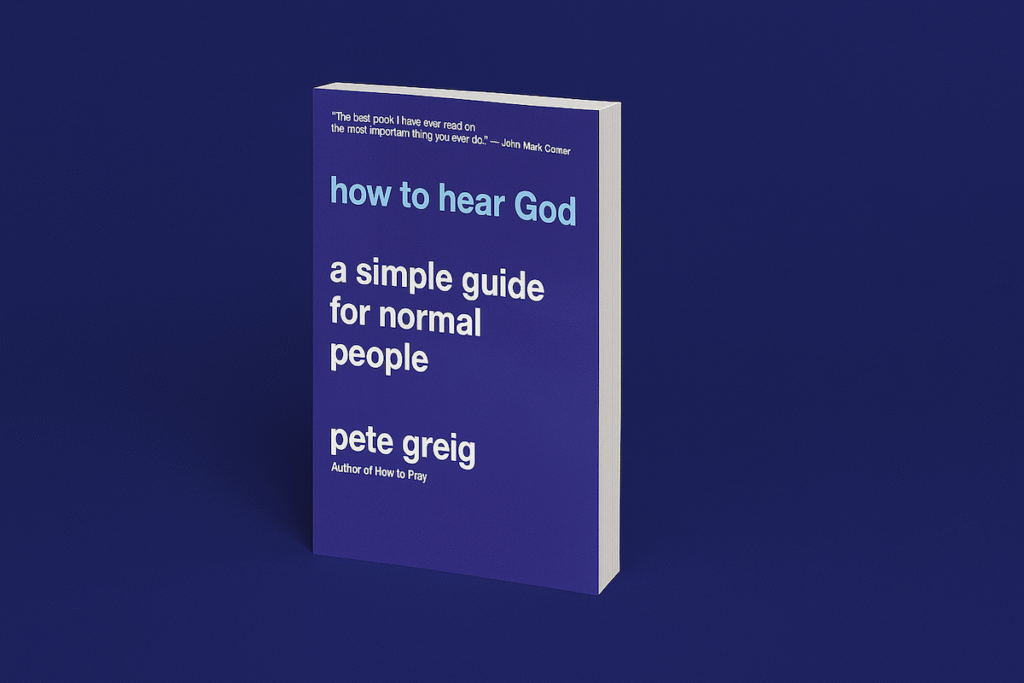
This is a review of How to Hear God: A Simple Guide for Normal People by Pete Greig. Published by Zondervan in 2022, the book carries endorsements from John Mark Comer, Matt Redman, Nicky Gumbel, Jon Tyson, Heidi Baker, and other notable figures. In it, Greig explores how to hear God, carefully examining “the story of Christ’s playful, poignant conversation on the road to Emmaus and championing the ancient practice of lectio divina” (Back Cover).
How to Hear God: Described by John Mark Comer
This book is well described by John Mark Comer, who notes in the foreword that Pete—and the book itself—has managed to bridge, or even move beyond, the “Christian tribalism of our day—charismatic/noncharismatic/Reformed/Wesleyan/Anglican/Anabaptist/conservative/progressive/etc, etc” (Greig 2022, XIV). I agree with Comer’s assessment and also share his belief that Pete, through this book, deeply roots us in “something far more ancient” (Greig 2022, XIV). The book thoughtfully addresses the need for deepened spiritual formation, explores how to hear God, and equips readers with practices and disciplines that cultivate a “real, conversational relationship with God” (Greig 2022, XV).
The Most Natural Thing in the World
As Pete Greig points out in How to Hear God, for followers of Jesus, “hearing [God’s] voice is therefore the most natural thing in the world… but whenever God’s word is confused, abused, or ignored, it can become one of the most perplexing and painful things too” (Greig 2022, XV). For many, hearing God’s voice has indeed been confused, abused, and even ignored. As a result, we often assume it’s impossible to hear Him at all. This book reminds us that it is essential to develop and commit to intentional practices and disciplines that help us rediscover our connection to God the Father, the Creator and sustaining life-force of all creation. These practices and disciplines, along with the insights from this book, serve as powerful reminders that God’s voice is often missed not because it is absent, but because it comes in ways we don’t expect—most often “in a voice hushed to a ‘gentle whisper’” (Greig 2022, XVII).
A Lack of Discipline in the Voice of God
Far too many followers of Jesus have never been discipled in how to discern God’s distinctive voice. This book offers a valuable guide, helping readers intentionally engage in spiritual practices that nurture attentiveness and responsiveness to God. Sadly, as Pete notes, even those familiar with these practices can become “distracted psychologically, emotionally, intellectually, or spiritually” and miss “the voice of God” (Greig 2022, 156). For all of us, the realignment of our spiritual lives through intentional commitment to spiritual disciplines is essential, and this book is a timely and encouraging call to that realignment.
Inside How to Hear God by Pete Greig
As a book, How to Hear God is a simple read, but that’s not a criticism. Its accessibility makes it especially fitting for readers who are new to the faith, just beginning to explore spiritual disciplines, or emerging from foundational programs like Alpha. In many ways, this book serves as an authoritative collection of wisdom from some of the greats of the faith, woven together with Pete’s own insights, commentary, and personal stories. Fellow author Shane Claiborne affirms this, noting that “this book draws from the well of wisdom that has nourished the faithful for centuries” (Greig 2022, i).
While this isn’t a deep academic dive into the desert fathers or an exhaustive treatise on spiritual disciplines, it stands out as one of the best introductory guides available—and it’s exceptionally well done. For that reason, I view it as a Spirit-focused and spiritually renewing counterpart to Richard Foster’s classic Celebration of Discipline. I suspect How to Hear God will now be my go-to recommendation in conversations about beginning or deepening a life of spiritual discipline.
How to Hear God: God’s Word & God’s Whisper
The book is divided into two sections: God’s Word and God’s Whisper. In the first section, Pete explores how God speaks through Scripture, prayer, and prophecy, drawing on stories from figures such as Augustine of Hippo, Ignatius of Loyola, and Heidi Baker. The second section, God’s Whisper, delves into the more subtle ways God communicates through dreams and visions, community, creation, culture, and more. Here, Greig reflects on the lives of Nicolas Herman (Brother Lawrence), Julian of Norwich, George Washington Carver, and others.
While I’ve noted that this book isn’t a deeply academic or intellectual read—which is appropriate for an introductory guide—it is far from shallow. Each chapter includes recommended resources, thoughtful discussion and reflection prompts, and the book concludes with over fourteen pages of citations. Simply put, Pete has done his homework—something that’s increasingly rare among contemporary authors.
About Pete Greig
Author Pete Greig is perhaps best known for founding the 24-7 Prayer Movement, which has developed numerous resources and inspired a global wave of people committed to intercessory prayer. In addition to this work, Greig serves as the Senior Pastor of Emmaus Road Church in Guildford, England. He is also a bestselling author, having written several influential books—including God on Mute—and is a regular contributor to the Lectio 365 daily devotional (Back Cover).
How to Hear God is intended as a companion to How to Pray: A Simple Guide for Normal People, yet it stands strong as a standalone book. Whether read in sequence or on its own, it offers valuable insight and guidance for anyone seeking to grow in their ability to listen to God.
How I Use This Book
Through my work at Water Street Mission, walking alongside individuals experiencing homelessness on their spiritual journey, I’ve recommended this book to several people and have already given away quite a few copies. Just this week, I ordered eight more to distribute. How to Hear God is a resource I will continue to recommend as I coach individuals in spiritual disciplines and help them discover practices that enable them to hear and recognize God’s voice.
Each year, I lead a few small groups within our homeless shelter, using the Prayer Course and Unanswered Prayer Course video series developed by Pete Greig and the 24-7 Prayer Movement. I’ve found How to Hear God to be especially helpful as a follow-up for individuals who are new to the faith and desire a more intimate walk with God after completing the Prayer Course. I was first drawn to this book because I committed to reading it alongside two individuals I’m currently mentoring in a coaching relationship.
Recommending How to Hear God by Pete Greig
In closing, the question that continues to stir in me, and a question I find myself repeating to others after reading this book, is this: “What if the thing you want God to say is not the thing you need God to say? Will you still hear and obey?” (Greig 2022, 199–200). Thank you for that challenge, Pete.
I wholeheartedly recommend How to Hear God to anyone seeking to grow in spiritual depth and discernment. Whether you’re new to the faith or longing for renewal, this book offers practical, Spirit-led wisdom that will help you listen for God’s voice in everyday life.



